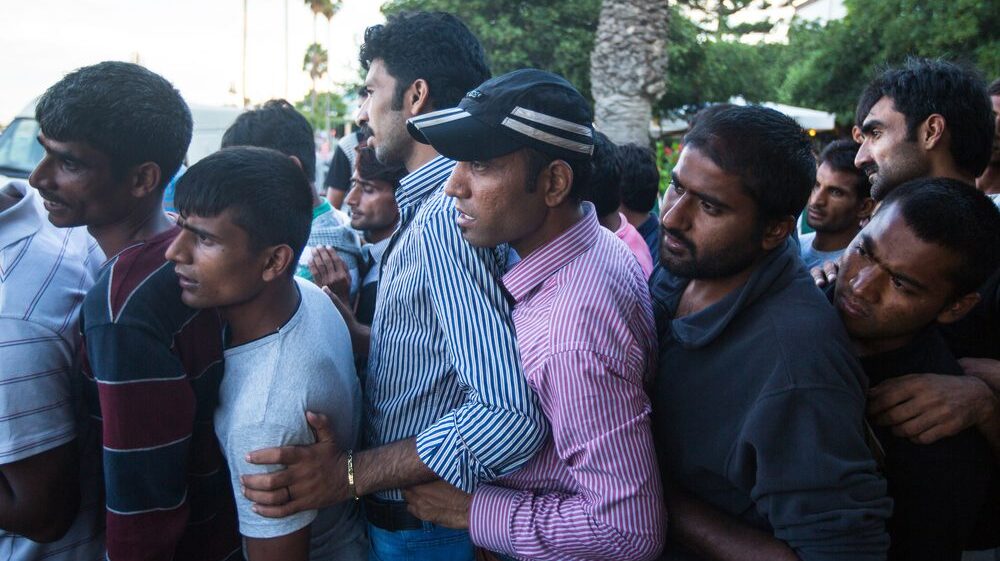
Photo: De Visu / Shutterstock.com
Germany and Greece are seeing a new surge of illegal immigrant arrivals this year as Greek reception centres on the Aegean islands are beginning to fill to capacity and Germany has reported the largest number of illegal migrants entering the country in a single month since 2016.
Germany published data on Saturday, October 21st indicating that around 21,000 people entered the borders of the country illegally in September. This is the highest number since February 2016, when over 25,000 people arrived during the European migrant crisis, which had started several months earlier in 2015.
According to a report from the European Union-funded website InfoMigrants, over 92,000 illegal migrants have entered Germany between January and September of this year so far. This is already higher than last year and far higher than 2021’s figures, which stood at over 57,000 for the year.
Greece, which was the epicentre of the 2015 migrant crisis, is also seeing a new surge in arrivals of illegal migrants, as reception facilities on some of the Aegean islands, such as Lesbos and Samos, are becoming overwhelmed.
In Lesbos, 4,609 migrants are currently living in the structure at Kara Tepe, which is designed to have a capacity of just 3,800. Meanwhile, the reception centre on Samos, designed to accommodate 3,650, is currently housing 4,415, according to a report from the newspaper Ekathimerini.
According to the newspaper, the facilities are overcrowded due to the procedures regarding the registry and identification of the migrants, which only see between 100 to 150 cases processed each day.
Those seeking asylum are not allowed to leave the Aegean island reception centres until their registry and identification processes are complete, which has led to a large backlog of cases and has contributed to the overcrowding of the facilities.
In September, Greece, like Germany, saw a surge of new illegal arrivals. Reports indicate that over 10,000 illegal migrants arrived that month, representing nearly a third of the 32,822 migrants who have arrived in Greece so far this year, according to statistics from the United Nations Refugee Agency UNHCR.
Of the 16,172 people currently living in reception centres on the Aegean Islands, around 3,000 are alleged to be Palestinians.
The ongoing conflict between Hamas and Israel has fueled speculation that many Palestinians may try to flee to Europe to escape a predicted ground offensive by the Israeli forces in the Gaza Strip. So far, however, no large waves of Palestinians have left the area as the borders to Israel and Egypt have remained closed.
The German government, meanwhile, has recently discussed facilitating more deportations of illegal migrants in order to ease the burden on the German reception system. The system has been strained due to the influx of migrants and pressures from accommodating Ukrainian war refugees.
German Interior Minister Nancy Faeser is set to introduce a new bill this week aimed at streamlining the deportation process and making deportations more efficient.
The bill aims to also increase the number of deportations of people smugglers and other criminals, providing new measures to make sure that deportations do not fail as they are attempting to be carried out.
However, police union chairman Jochen Kopelke told German media that the new legislation would put an increased burden on police and claimed that in order to carry it out properly, more officers would be needed.
“We are heading for an incomprehensible burden for the police in the mere design of the legislation,“ Kopelke said.”There is a shortage of more than 300 police officers to implement the repatriation package. If there are more deportations, we need at least this number of additional workers.”
So far this year, the bulk of the illegal entries into the European Union have come through the Central Mediterranean to Italy. The route has accounted for around half of all of the entries into the EU from January through September, according to the European Union border agency Frontex.
While the number of arrivals to Italy slowed somewhat in September, Italian Interior Ministry data has revealed that the number of illegal arrivals this year between January 1st and October 20th is double those of the same period in 2022.
The period also largely coincides with when conservative Prime Minister Giorgia Meloni took office last year in late October. Despite promising to crack down on illegal migration, she has so far largely failed as the number of arrivals has doubled under her premiership.
